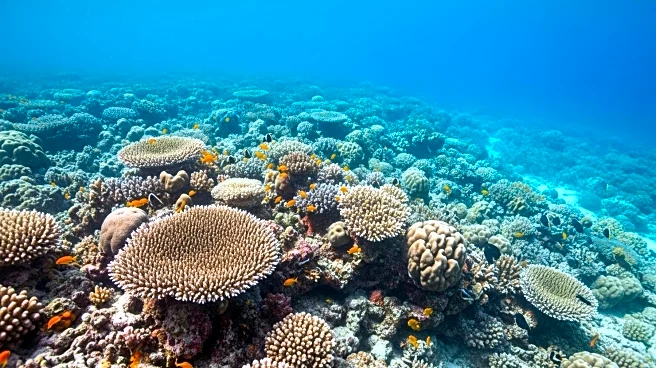What is the story about?
What's Happening?
Conservation efforts are undergoing significant changes as global temperatures are projected to rise by 3-5°C this century. Traditional conservation methods, which focused on preserving ecosystems as they were, are no longer viable. The movement of species, such as tuna and cod, to cooler waters is already impacting fisheries, particularly affecting small island nations that rely on these species for revenue. On land, protected areas designed for 20th-century biodiversity are becoming obsolete as species migrate to new habitats. Scientists are advocating for 'climate-smart' parks that are larger, better connected, and adaptable to change. New conservation strategies include assisted colonization and rewilding, which aim to help ecosystems adapt to changing conditions.
Why It's Important?
The shift in conservation strategies is crucial for maintaining biodiversity and supporting communities that depend on natural resources. As species migrate due to climate change, traditional conservation methods are proving inadequate, threatening food security and economic stability for coastal and island communities. The adoption of dynamic conservation tools and governance systems is essential to manage these changes effectively. The success of these new strategies will determine whether ecosystems can continue to support life under altered conditions, impacting global biodiversity and human livelihoods.
What's Next?
Future conservation efforts will likely focus on implementing 'climate-smart' strategies that prioritize flexibility and local participation. This includes creating corridors for species migration and co-managing protected areas with local communities. The success of these initiatives will depend on the willingness of governments and organizations to invest in adaptive management and real-time monitoring systems. As these strategies are tested and refined, they may serve as models for global conservation efforts in a changing climate.
Beyond the Headlines
The evolving conservation strategies highlight the need for a paradigm shift from preserving historical ecosystems to fostering resilience in the face of climate change. This shift involves ethical considerations, such as the potential risks of assisted colonization and rewilding. However, the greater risk lies in inaction, which could lead to the collapse of ecosystems and the loss of biodiversity. The challenge is to balance intervention with natural processes to ensure a sustainable future.
















